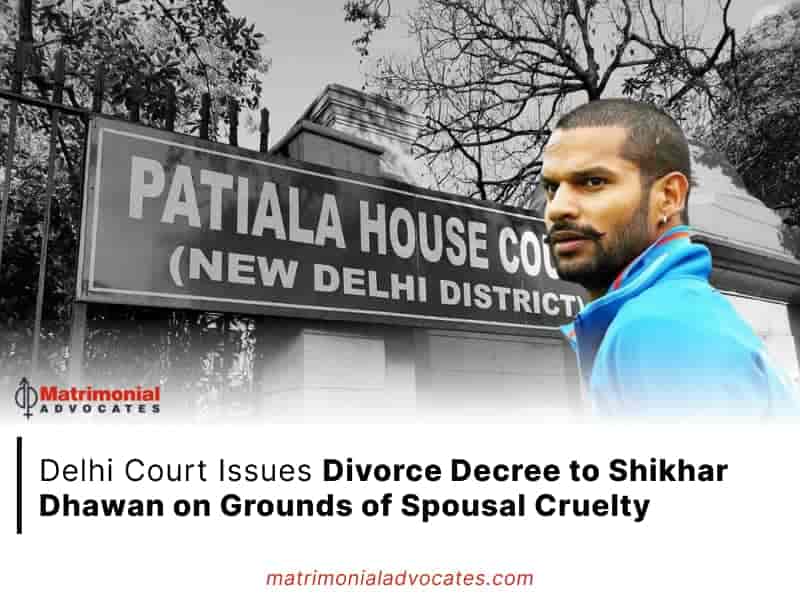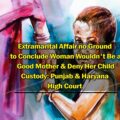
Family Court Judge Harish Kumar accepted majority of the allegations made by Dhawan against his estranged wife and held that she subjected him to mental agony and cruelty.
In a recent legal judgment rendered on Wednesday, a family court located in Delhi effectively resolved a contentious legal dispute involving Shikhar Dhawan and Aesha Mukerji. The ultimate outcome of these legal proceedings culminated in the issuance of a divorce decree in favor of the cricketer Shikhar Dhawan, predicated upon allegations of spousal cruelty advanced against his spouse.
Presiding over the case, Judge Harish Kumar rendered a verdict in favor of Mr. Dhawan on all the grounds enumerated within his divorce petition. The judgment was delivered in consideration of Mrs. Mukerji’s deliberate decision not to contest the aforementioned allegations or provide a substantive legal defense.
Judge Kumar duly acknowledged the fact that Mrs. Mukerji’s actions, which precipitated Mr. Dhawan’s protracted separation from their sole offspring, had resulted in significant emotional distress for the petitioner.
Significantly, while the court abstained from issuing a definitive ruling concerning permanent custodial arrangements for the couple’s child, it did, however, accord visitation rights to Mr. Dhawan. These visitation rights encompass the privilege to spend a reasonable duration of time with the child in both the territorial jurisdictions of India and Australia, inclusive of the provision for remote communication by means of video technology.
Furthermore, the court mandated that Mrs. Mukerji undertake the necessary measures to ensure the physical presence of the child in India during visitation periods. This directive encompasses the prospect of overnight stays with Mr. Dhawan and his extended family for at least fifty percent of the school vacation period within the academic calendar.
“Since petitioner is a reputed International Cricketer and has been pride of the nation, subject to petitioner approaching the Union Government of India, it is requested to take up the issue of visitation/custody of the minor son with its counterpart in Australia to help him have regular visitation or chatting with his own son or his permanent custody,” the Court ordered.
Consonant with Mr. Dhawan’s assertions, his spouse initially communicated her intent to establish her primary residence in India alongside him. Nevertheless, she encountered a hindrance in fulfilling this commitment, arising from a prior obligation to her former spouse, with whom she jointly maintains the custodial responsibilities for two daughters. This antecedent commitment necessitated her continued legal residence in Australia, where she presently resides with her two daughters and a child she shares with Mr. Dhawan.
“He (Dhawan) for no fault of his own had been through immense agony and anguish of living separately from his own son for years. Even though the wife denied the allegation, submitting that though she genuinely wanted to live in India with him, however due to her commitment towards her daughters from her previous marriage requiring her to stay in Australia, she could not come to live in India and that he was well aware of her commitment, yet she did not choose to contest the claim,” the judge noted.
Unchallenged testimony of Dhawan has to be believed, the judge said, while adding,
“Hence, it stands proved that the wife backtracked from her assurance of setting up matrimonial home in India after marriage and thus made him suffer a long distance marriage and suffer immense agony and anguish of living separately from his own son for years.”
The Court conducted a comprehensive examination of Mr. Dhawan’s assertion that his spouse had exerted undue influence upon him, compelling the transfer of 99 percent ownership in three properties situated in Australia, properties he had acquired utilizing his personal financial resources. In addition, the Court took due notice of her firm insistence on co-ownership of two additional properties.
Subsequently, the presiding judge rendered a determination that Aesha’s deliberate omission to contest this specific allegation amounted to her tacit acceptance of Mr. Dhawan’s version of events.
“Thus, in the absence of any of probable defense, Dhawan’s allegation that she compelled him to make her owner to some extent in all three properties or that she pocketed sale proceeds thereof to the extent pleaded and testified to by him has got to be believed as true,” it was held.
Regarding the allegation that Aesha deliberately spread defamatory messages to various individuals associated with the country’s cricket board, IPL team owners, and fellow cricketers, her defense revolved around the claim that she had only directed these messages to three specific recipients. She argued that her primary aim was to ensure the timely receipt of her monthly maintenance payments due to Dhawan’s repeated delays in fulfilling this financial obligation.
Nevertheless, the Court did not support her defense and ultimately concluded that she had indeed sent harmful communications to multiple recipients, presumably with the intention of applying pressure, tarnishing Dhawan’s reputation, and subjecting him to public humiliation.
Furthermore, the Court upheld the accusation that Aesha had a disagreement with Dhawan regarding his “allocation of time” in providing support to his ailing father during the period when he contracted COVID-19.
“Petitioner further alleged that in or around January 2020, the Aesha and the minor son came to India to spend a prolonged period of time, but her daughters stayed back in Australia but still she compelled him to send her daughters AU $15,500 per month (inclusive of mortgage payments) on the pretext that they were struggling to survive,” the Court noted.
In addition to the aforementioned financial obligation, Mr. Dhawan incurred supplementary expenses associated with school fees. Consequently, he found it imperative to augment the monthly payments initially to AU $16,500 and subsequently to AU $17,500 per month.





